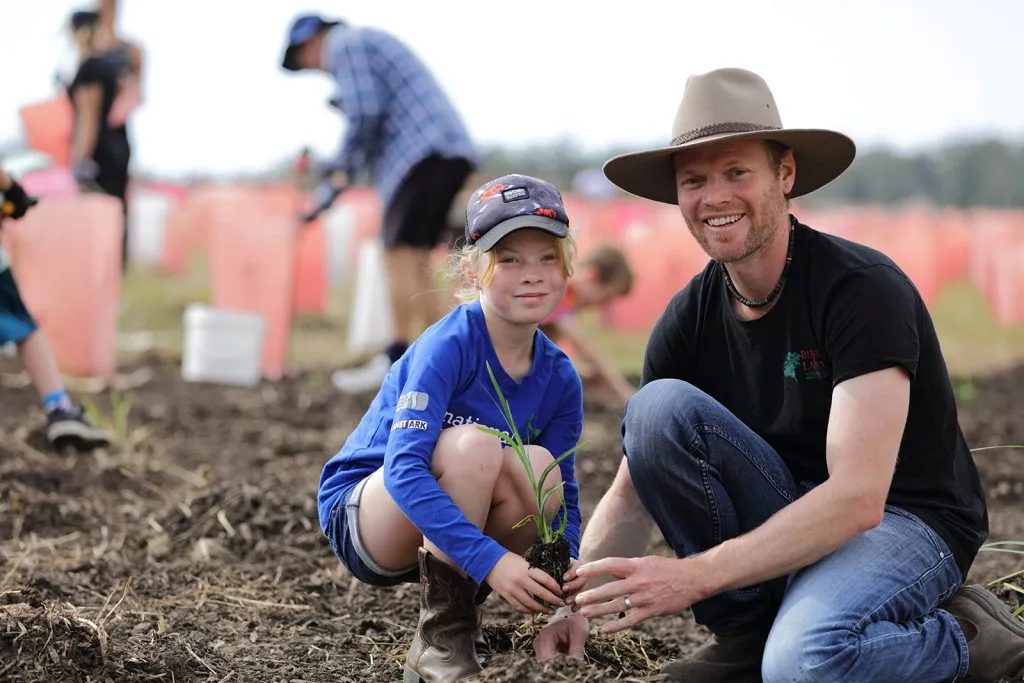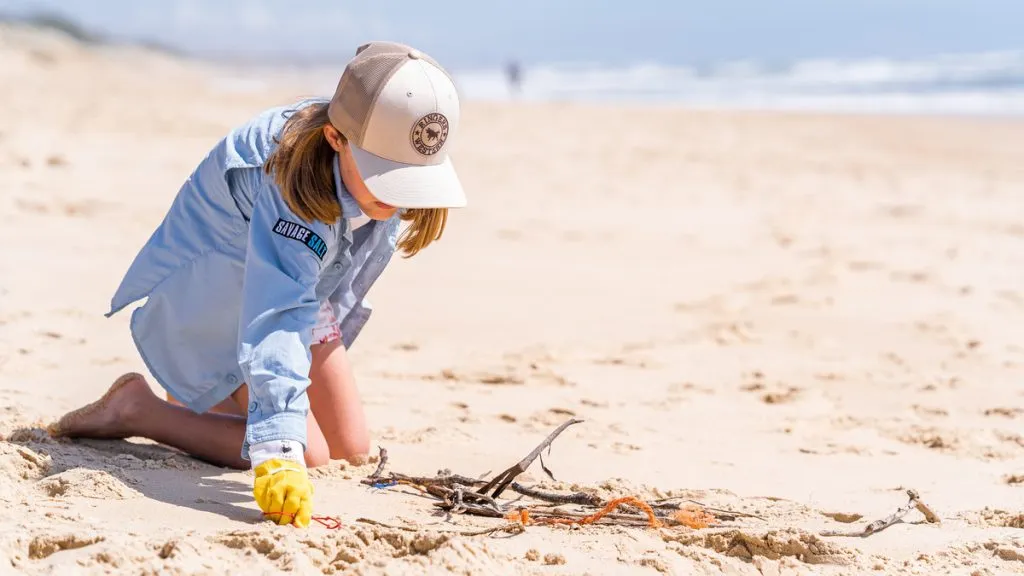Nine simple ways to help protect our waterways

What better way to spend summer on the Sunshine Coast than enjoying our beautiful waterways and beaches?
Our region is home to five major river catchments: the Mooloolah River, Maroochy River, Pumicestone Passage and headwaters of the Stanley and Mary Rivers.
As a UNESCO Biosphere community, we can all contribute to ensuring our waterways remain healthy as we live, work, learn and play sustainably.
Healthy waterways mean healthy people as we swim, fish, kayak and explore our waterways, wetlands and coastal areas. Maintaining the health of our waterways is also important to many of our local businesses, including those relying on tourism, fisheries and agriculture, just to name a few.
Helping our waterways is easy! What action will you take today?
🌿Plant trees
🖐️Remove litter
⛵️Boat and fish responsibly
🍳Deal with everyday oils
👩🌾Garden smarter
🚗Wash the car
🧴️Clean better
📢Report pollution
🔍Learn to spot weeds
1. Plant trees
Plant trees and shrubs on your property, especially in areas prone to erosion, or get friends and family involved in tree planting events, especially for areas near creeks and rivers.

Get your hands dirty at a local tree-planting event, for a satisfying and free or low-cost weekend activity.
Who doesn’t love spending the afternoon under a shady tree? Our wildlife and waterways love them too.
Trees support our creek and river edges by helping prevent landslips and erosion that would increase sediment levels and damage plant and animal habitats.
They also keep light and temperature at optimal levels and provide food and habitat for aquatic animals through leaves and limbs that fall into the waterways.
2. Remove litter at every chance
If you see it, grab it! Otherwise, why not take the family and make a day of it?
A litter-collection adventure is a wonderful opportunity for the kids to learn environmental responsibility and take on a project to be proud of, all while exploring the parks, conservation areas, beaches and waterways the Sunshine Coast has to offer.
Collecting litter before it can wash into our waterways is an easy way to prevent environmental harm, and ensure our creeks, rivers and beaches remain beautiful.

Cleaning up our waterways and beaches is a great activity to get the kids involved in environmental responsibility.
With every rain event, more plastic litter is washed into our waterways.
Much of this will eventually make its way to our oceans and beaches, posing a danger to our wildlife and breaking down into harmful microplastics.
As a single example, our sea turtles can mistake plastic for food, so every piece removed is a potential life saved.
3. Be sensitive to waterways and wildlife while boating
For those heading out on the water along our rivers and creeks, responsible boating is vital to avoid damaging the waterways we love.
Minimise boat wash where possible, as it erodes the banks of our creeks and rivers, harming vegetation and increasing the sediment load, which further impacts aquatic plants and animals.
It is also vital all fishers stick to bag limits to help preserve our fish stocks for future generations and keep our ecosystems thriving.
Avoid disturbing shorebirds, many of which need to build up energy for massive journeys to breed in the northern hemisphere. Every feeding opportunity makes a difference for our feathered fauna.
4. Minimise oil use and dispose of oils correctly
Never pour oils of any kind down the drain. Try to use cooking oils sparingly and opt for non-stick pans instead to avoid leftover oils when it comes to cleaning up.
Used cooking oil can be poured into a small hole in the garden and covered in mulch. Other oils, including motor oil, can be disposed of for free at select Sunshine Coast Council Resource Recovery Centres.
Oil substances can’t be effectively treated in sewerage treatment plants and will often end up discharged into waterways or the ocean.
Oils in our waterways reduce the amount of oxygen able to be dissolved in water, which is vital for aquatic life including fish. It can also coat birds’ feathers and impact their ability to fly.
5. Ease up in the garden
Gardening is a wonderful way to improve mental and physical health and create habitats for our native flora and fauna, but it’s important we use fertiliser, pesticides and herbicides sparingly.
Excessive nutrients including nitrogen and phosphorus eventually wash into our waterways, and can cause algal blooms that throw ecosystems out of balance and even pose a health hazard to humans. Where possible, choose an organic or low-phosphorus fertiliser.
Never throw garden waste or lawn clippings into a waterway, as this will contribute to excess nutrients and potentially algal blooms and fish kills. Make sure all garden waste and clippings are properly composted or disposed of.
6. Move your car washing bay
Whether you’re a clockwork Sunday washer or only begrudgingly dig out the wash bucket after strangers have started writing in the dust, protecting our aquatic systems means just one simple change: washing the car on a grassy area, not on the driveway or road.

Making a positive change for our waterways is as simple as washing the car on the grass.
This prevents detergents from rushing into gutters and down stormwater drains, which flow straight into our waterways. Try to also use as little detergent as possible.
7. Inspect your cleaning products
Choose detergents, washing powders and cleaning products that are low in phosphates. Commercial toilet cleaners and fresheners contain chlorine and hydrocarbons, which can harm animals in our waterways. Use a brush and vinegar instead, and bicarbonate of soda for stains.
Domestic sewage is treated before discharge into waterways, but treatment plants aren’t perfect and some pollutants cannot be removed entirely. Reducing the amount of these pollutants going into our sewerage systems is key.
8. Report pollution events
Have you witnessed pollution that will impact our catchments? Council and the Queensland Government have channels available for residents to submit a report:
- You can report sediment or litter entering a roadside gutter, stormwater system or waterway on Council’s website
- For significant pollution events, call the Queensland Government’s pollution hotline on 1300 130 372
- Boating-related marine pollution complaints can be made to Maritime Safety Queensland on (07) 5585 1810.
9. Get to know our invaders
Invasive plants can displace native vegetation in and around our waterways and even be toxic or dangerous to animal life. Learn about our local invasive plants and report a priority invasive plant on Council’s website.
Read more about council projects:
Sunshine Coast Council works to maintain and improve our waterways, with initiatives including the Blue Heart project in the Maroochy River floodplain, innovative projects to address erosion and sediment control, and programs to acquire, protect and restore environmental lands and habitats in partnership with our community.
- Environment Levy Annual Report
- Sunshine Coast tree planting and BushCare events
- Environment and Liveability Strategy
- Blue Heart Sunshine Coast
- Sunshine Coast Biosphere
- Sunshine Coast Shorebirds
Sources: